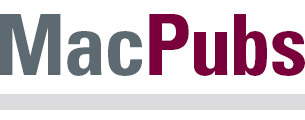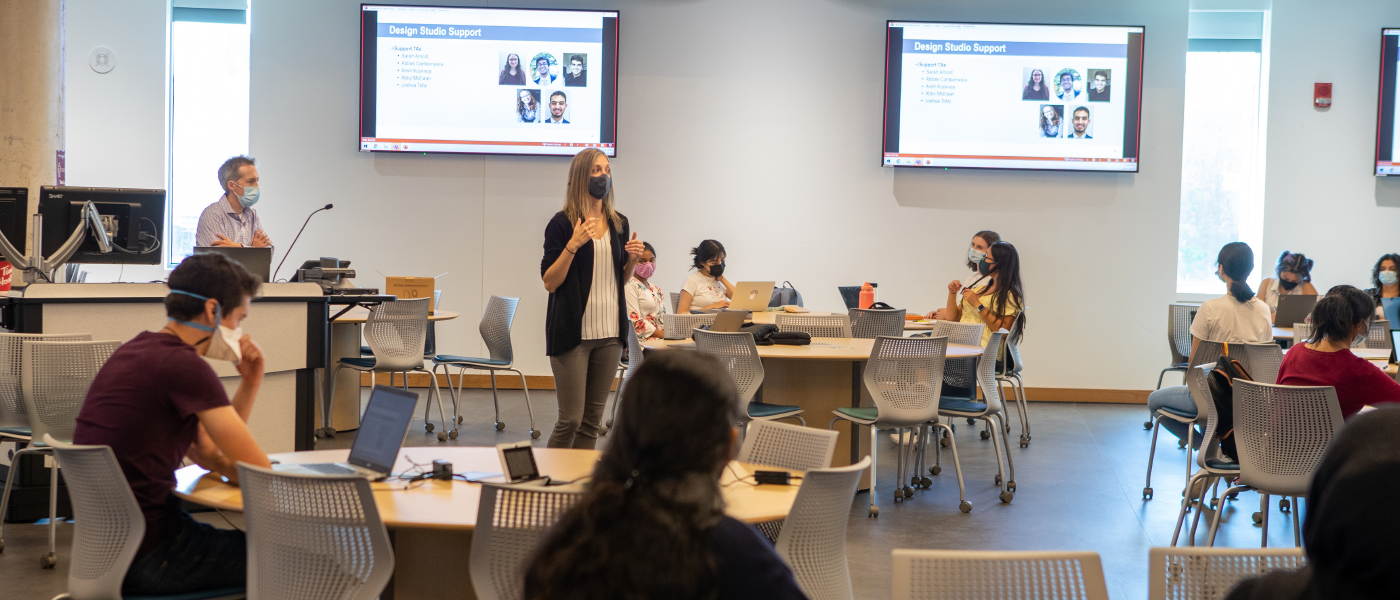Priority 2: Teaching and Learning
Information Box Group
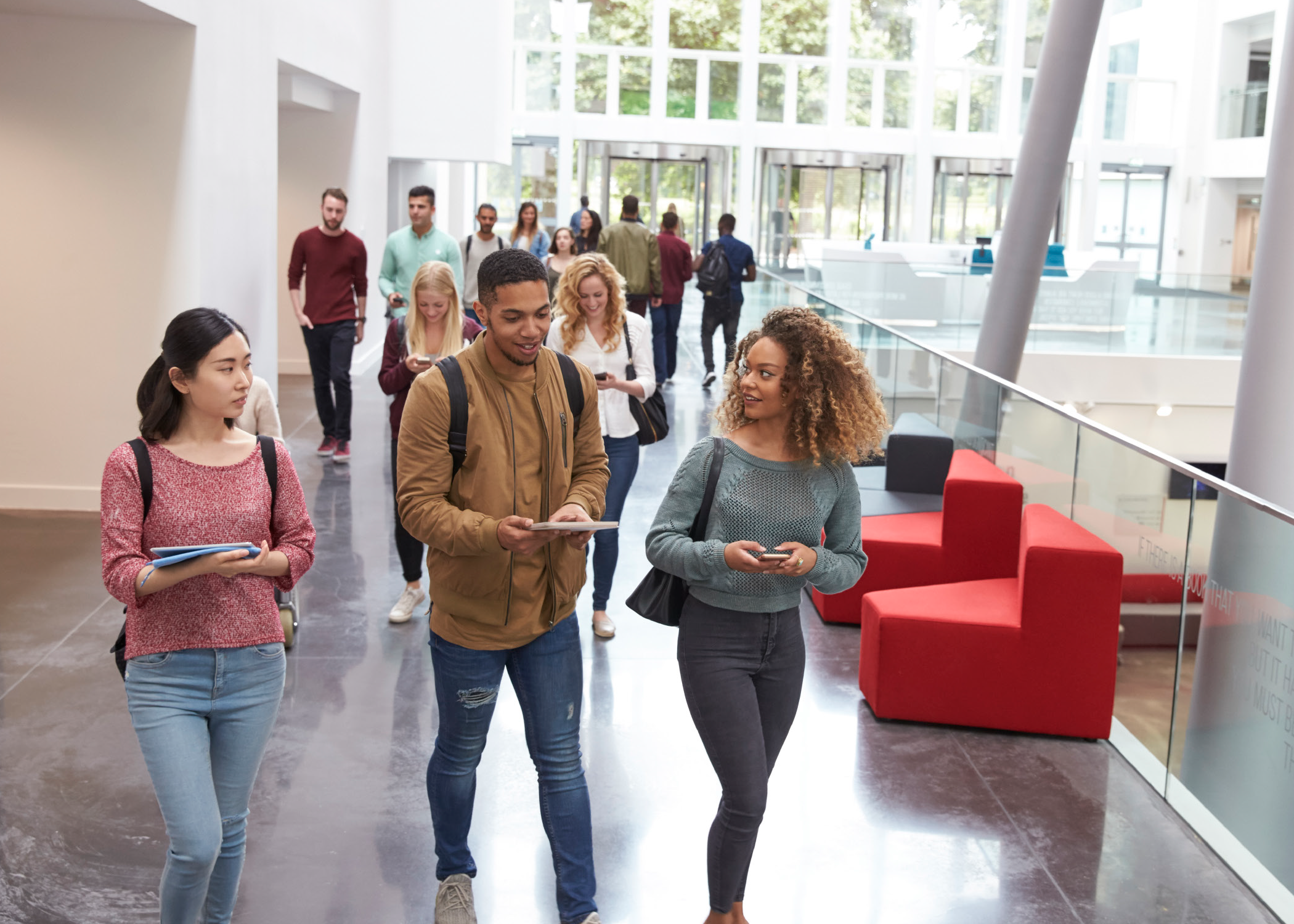
Engage in partnered and interdisciplinary learning, exemplifying an environment that is inclusive of diverse perspectives across disciplines and embracing global insights to explore beyond traditional disciplinary boundaries
Information Box Group
McMaster’s Teaching and Learning Strategy, Partnered in Teaching and Learning, has:
- Established annual grants aimed at encouraging innovations in teaching and learning and improving student experiences and outcomes.
- Interviewed faculty members about their experiences in developing interdisciplinary programs or teaching in inter-disciplinary contexts to identify barriers, enabling factors and recommendations.
- Appointed a new Vice-Provost Teaching and Learning to support the implementation of the Teaching and Learning Strategy and the enhancement of the quality of teaching, both within and beyond instructional spaces.
The School of Rehabilitation Science has partnered with the Faculty of Humanities to develop a new undergraduate interdisciplinary degree. The Bachelor of Health Science (BHSc) integrated Rehabilitation and Humanities program will be the first degree of its kind to focus on the restoration, maintenance, and improvement of health through rehabilitation alongside deep engagement with what it means to be human.
Learn More
McMaster’s Continuing Education (MCE) continues to place an emphasis on lifelong learning and excellence through partnered and interdisciplinary education opportunities:
Ninety-five per cent of students participated in at least one course with experiential learning components upon graduation in 2019 from undergraduate programs (Strategic Mandate Agreement Metric 7), and growth in experiential learning opportunities has enabled McMaster to leverage $200,000 in wage subsidies and employer funding in the past year to support over 450 student placements across all Faculties.
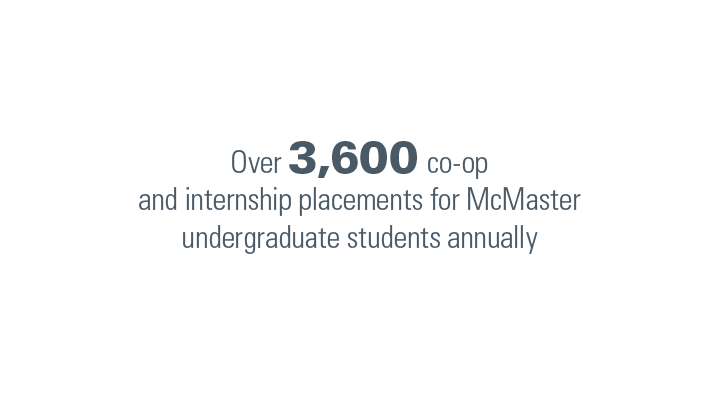
Information Box Group
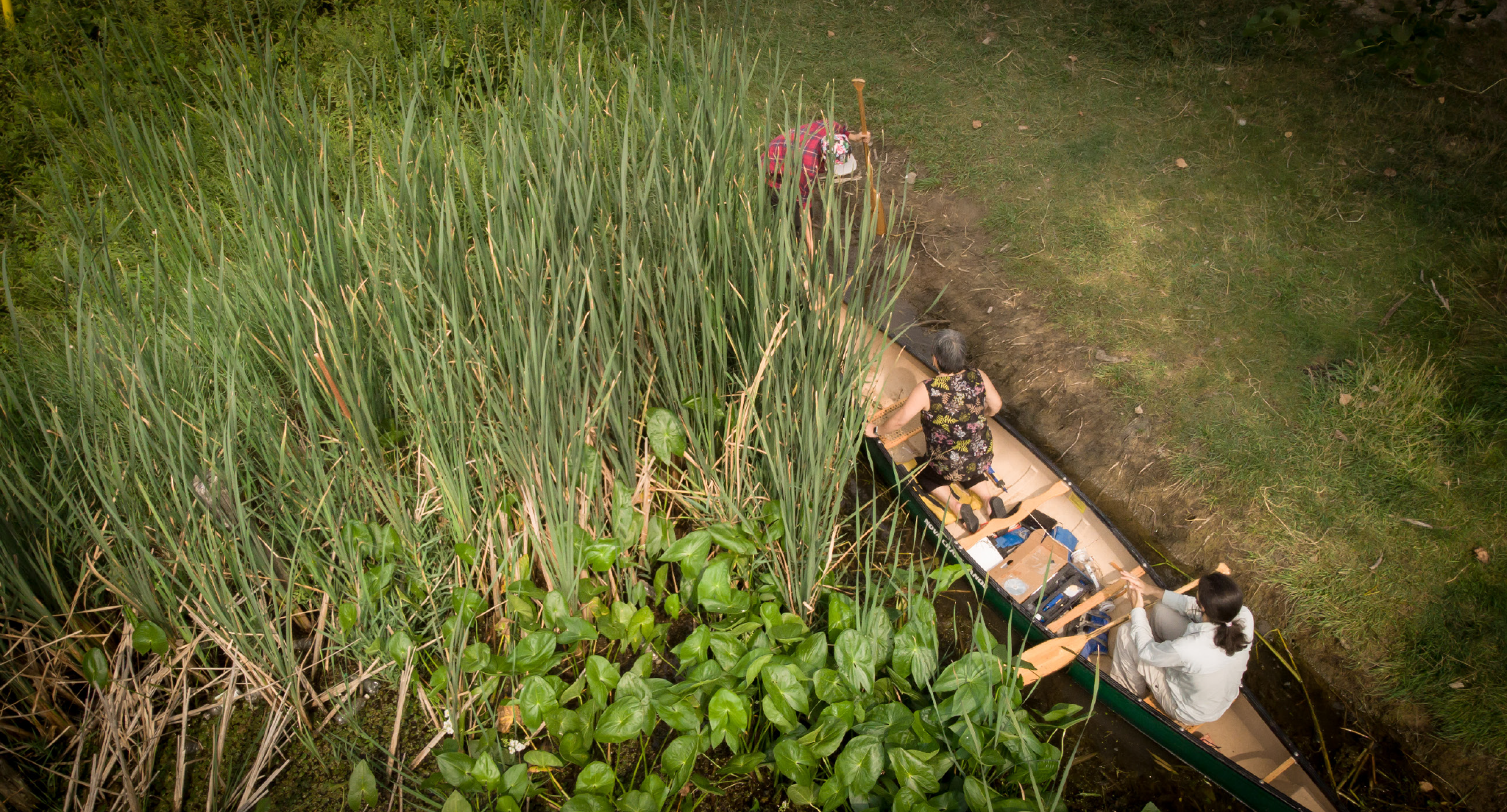
Active and flexible learning spaces to ensure that our physical and virtual spaces support learning outcomes and ensure accessibility and inclusivity to meet the needs of our communities.
Information Box Group
The DeGroote School of Business is transforming its Bachelor of Commerce program with an emphasis on problem-based discovery, interdisciplinary study, and interaction with business leaders that will prepare its graduates to succeed in the workplace for years to come. Starting in 2021/22, new courses were introduced, each one designed to offer unique experiential education, collaboration and applied problem-solving opportunities.
Learn More
In 2021 the Department of Chemistry & Chemical Biology launched the first Honours Sustainable Chemistry program to be offered at a Canadian university.
The Faculties of Science, Engineering and Health Sciences collaborated to open the Centre for Advanced Light Microscopy. The centre supports high quality cross disciplinary research and trains future generations of microscopists.
Fifty-two per cent of students were enrolled in McMaster’s program areas of strength and focus. McMaster had the highest proportion amongst the G6, which had an average of 37 per cent in the SMA 2019-20 reporting year (Strategic Mandate Agreement Metric 2).
Development of holistic, transformational and personalized student experiences intended to promote personal growth, support health and well-being, and enhance a sense of belonging and connectedness in our community
Information Box Group
A key component to experiential learning is the inclusion of reflection. McMaster researchers leveraged the SUSTAIN courses to develop the Reflective Learning Framework to guide and assess student learning through experience. The framework has been adopted by educators at McMaster and other institutions of higher education.
McMaster’s Academic Sustainability Programs Office launched the Student Sustainability Ambassador Program (SSAP), which is a co-curricular program and community hub for sustainability-minded undergraduate and graduate students and student clubs. SSAP fosters student leadership in sustainability through collaborative and active learning. SSAP has engaged over 150 students representing every Faculty and the Arts & Science program.
With funding from the MacPherson Institute, the Global Health program has developed an experiential simulation as an instructional strategy to be used in the Global Health Research Methods Course. Additionally, funding is enabling the Global Health program to explore the use of microcredentials as an approach to consolidate, evaluate and credit transferrable skills that students gain throughout their time in the program and provide motivation and confidence as they make the transition into the workforce.
Learn More
McMaster continues to place an emphasis on mental health support with several initiatives and programs:
Nine McMaster students were nominated or won awards for the contributions they made through their work placements this year. In addition, McMaster facilitates more than 3,600 co-op and internship placements for undergraduate students annually.
The university’s alumni program offers several career support and mentoring opportunities for students as they transition to life post-graduation and for young alumni in their first ten years after graduation, including an online mentoring platform, monthly drop-in events for graduating students and young alumni, and the Unconventional Podcast, which features alumni stories of their journeys after graduation.
The Faculty of Engineering’s Co-op and Career Services office has a new focus on career education. This includes developing a framework for career education programming that enables all students to engage in experiential learning and prepare for career decision-making proactively and knowledgably. Engineering is also working to embed experiential learning into all years of the curriculum.
Learn More
McMaster’s Student Success Centre has continued to invest in career services to better serve students as they transition to the workforce:
In 2021, 11 postdoctoral fellows participated in the made-at-McMaster McCall McBain Postdoctoral Fellows Teaching & Leadership Program. Since launching in 2019, 34 postdoctoral fellows have participated in the year-long training and development program.
McMaster prepares graduates for meaningful lives and careers, demonstrated with 82 per cent of fall 2013 full-time, first-year undergraduate students graduating from McMaster within seven years (Strategic Mandate Agreement Metric 3) and median employment earnings of $56,631 two years after graduation in 2016 (source: Education and Labour Market Longitudinal Platform, Statistics Canada; Strategic Mandate Agreement Metric 9).
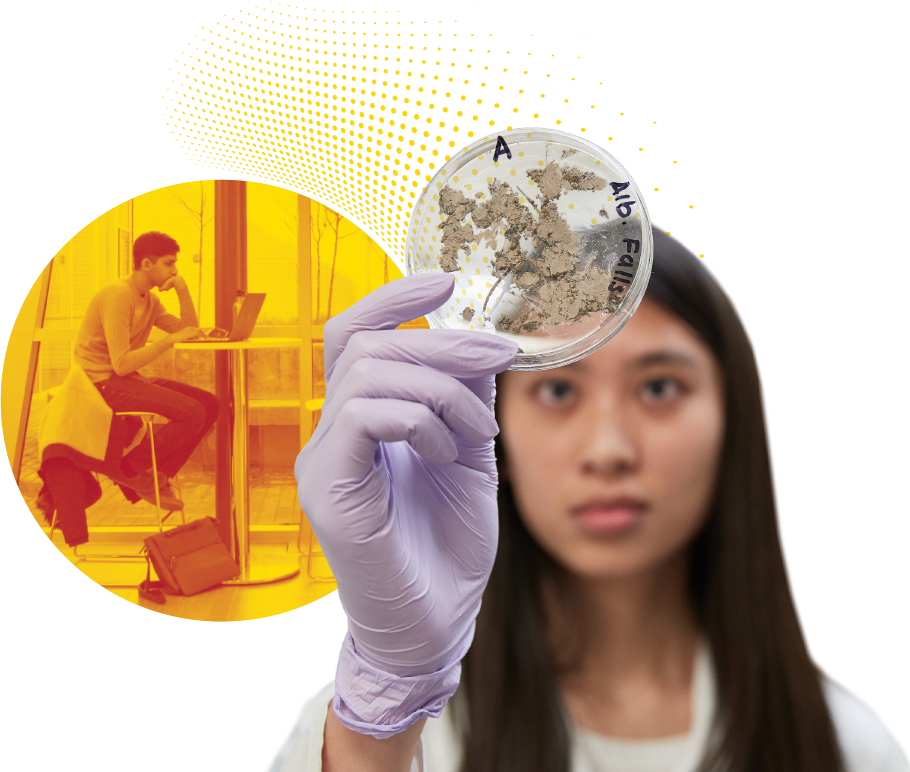
Information Box Group

Inclusive and scholarly teaching that values creativity, risk taking and originality as a foundational aspect of the McMaster educational experience
Information Box Group
The Student Success Centre developed a centralized web page and exam readiness campaign to support students as they transitioned back to in-person exams. The initiative resulted in more than 4,700 page views, 521 one-on-one student conversations with peers and staff about exam readiness, and 50,000 combined views on Instagram.
In 2021, McMaster established an institution-wide training program for teaching assistants (TAs) and research assistants, providing training in anti-oppression and TA rights and responsibilities with additional elective workshops available. As of Spring 2022, more than 2,900 participants across the university have completed the training.
Learn More
The MacPherson Institute has introduced new supports for instructors for assessment:
- During the COVID-19 pandemic there was an increased need for alternative means of assessment.
Active and flexible learning spaces to ensure that our physical and virtual spaces support learning outcomes and ensure accessibility and inclusivity to meet the needs of our community.
Information Box Group
Since the COVID-19 pandemic began, the Faculty of Health Sciences Continuing Professional Development Office has co-designed, developed, and delivered 21 unique continuing medical education activities and offered hundreds of opportunities for faculty to learn online, with more than 1,000 attending digital events. The office has also established a free, unrestricted online access library with hundreds of videos, a new podcast (MacPFD Spark) and a selection of online articles.
Working collaboratively with Toronto Metropolitan University, McMaster increased enrolment in its Midwifery program by absorbing additional students who were previously enrolled in Laurentian University’s midwifery education program, which was discontinued in 2021. This helped sustain the province’s goal of training 90 new midwives per year.
The DeGroote School of Business announced the addition of a tenth floor on the McLean Centre for Collaborative Discovery to provide new space for PhD students, faculty, and visiting scholars. The space will enable undergraduate students to interact with graduate students, faculty members, post-doctoral fellows and visiting scholars.
Learn More
As part of the Virtual Learning Strategy announced by the Ontario government, McMaster received over $2.5 million in March 2021 to fund 28 projects. The funding is supporting key priority areas for creating digital content, providing skills to faculty and students, and identifying educational technologies to support online course and program offerings.
McMaster programs provide high-quality preparation for future careers. In the 2019 Ontario University Graduate Survey of McMaster’s 2017 graduates, 92.7 per cent of those in full-time employment indicated they were in employment that was closely related or somewhat related to the skills they studied at university (source: Ministry of Colleges and Universities’ 2019 Ontario University Graduate Survey; Strategic Mandate Agreement Metric 1).
Information Box Group
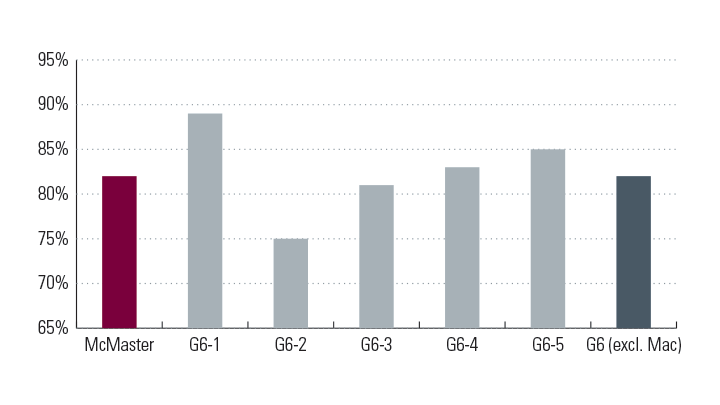
Graduation Rate - 2019/20
Note 1: Data sourced from University Statistical Enrolment Report (USER)
– Enrolment and Degrees Awarded data collections.
Note 2: Proportion of all new, full-time, year one university students of undergraduate (bachelor or first professional degree) programs who commenced their study in a given fall term and graduated from the same institution within seven years (e.g., 2019-20 data represents the percentage of 2012 entering cohort graduated as of 2019 calendar year).
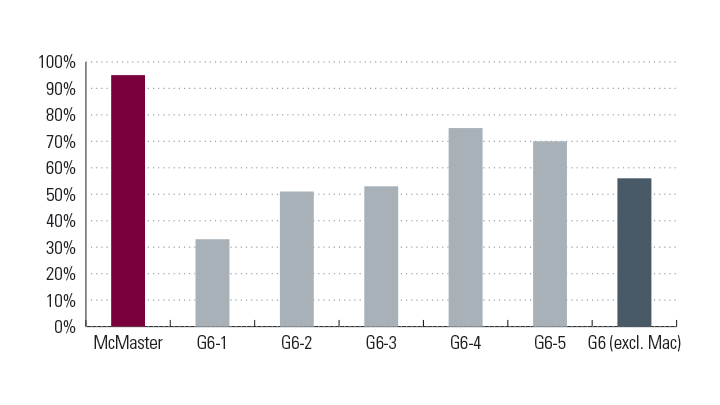
Experiential Learning - 2019/20
Note 1: Number and proportion of graduates in undergraduate programs, who participated in at least one course with required Experiential Learning (EL) component(s).
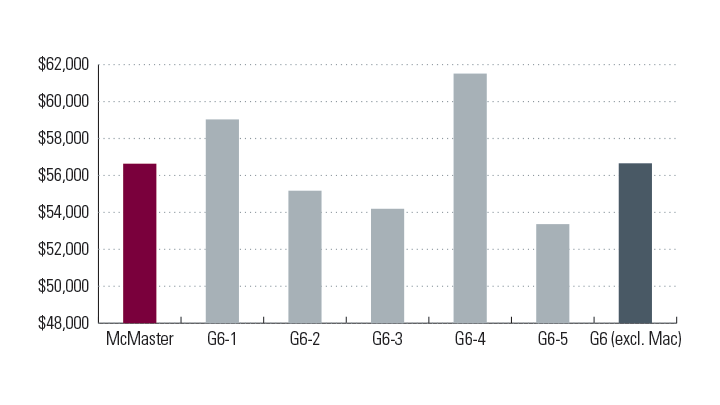
Graduate Employment Earnings - 2018/19
Note 1: Data sourced from Education and Labour Market Longitudinal Platform (ELMLP), Statistics Canada.
Note 2: Median employment earnings of university graduates, two years after graduation (e.g., 2018-19 data represents earnings of 2016 graduates in 2018 calendar year).
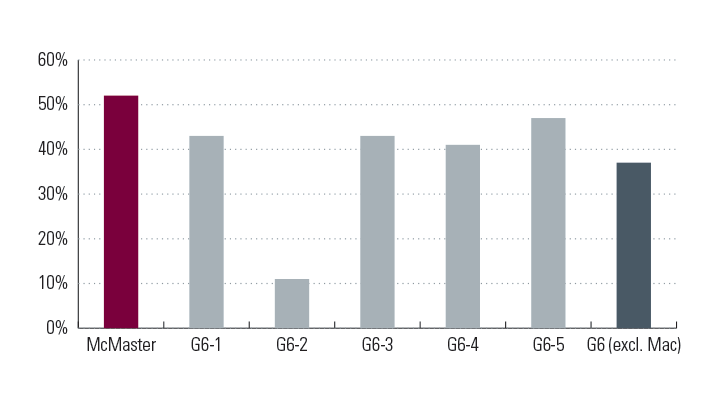
Institutional Strength/Focus - 2019/20
Note 1: Data sourced from University Statistical Enrolment Report (USER),
enrolment data collection.
Note 2: Proportion of enrolment in institution’s program area(s) of strength.
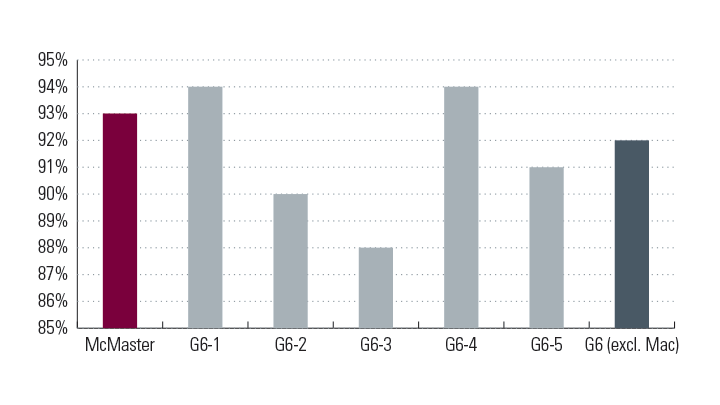
Graduate Employment Rate in a Related Field - 2019/20
Note 1: Data sourced from Ministry of Colleges and Universities Ontario University
Graduate Survey (OUGS).
Note 2: Proportion of graduates of undergraduate (bachelor or first professional degree) programs employed full-time who consider their jobs either “closely” or “somewhat” related to the skills they developed in their university program, two years after graduation. (e.g., 2019-20 data represents employment rate of 2017 graduates in 2019 calendar year).

